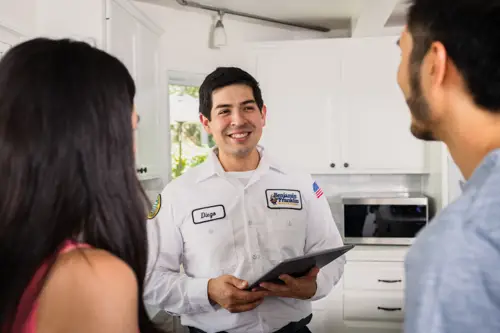 A properly sized water heater greatly impacts the comfort and energy efficiency of your home, whether you’re doing laundry, taking a shower or washing dishes. There are several key considerations to think about when choosing the right size.
A properly sized water heater greatly impacts the comfort and energy efficiency of your home, whether you’re doing laundry, taking a shower or washing dishes. There are several key considerations to think about when choosing the right size.
Number of People Living in the Household
Your daily hot water needs will be directly proportional to the number of people living in your home. You should also think about how many baths or showers you and your family take, as well as other uses such as cleaning dishes, washing hands and laundering clothes. The typical human requires 20 to 30 gallons of hot water daily. A daily requirement of 80 to 120 gallons of hot water is usual for a family of four.
Peak Hour Demand
When doing numerous things at once, such as taking a number of showers, washing dishes and doing laundry, it is essential that your water heater has enough hot water to meet all of your demands. This is why you need to consider your home’s “peak hour demand.” You can calculate the peak hour demand by adding up all the gallons of hot water used during the busiest part of the day. Your peak hour demand would be 56 gallons if, for instance, you anticipate two 40-gallon showers, a 6-gallon dishwasher load and a 10-gallon load of laundry all happening in the same hour.
Type of Water Heater
What you need in terms of size and capacity to guarantee that you have adequate hot water at all times is heavily dependent on the kind of water heater you select. There are two main types: tank-style and tankless. A tank-style water heater heats water and stores it in a tank. When the tank runs out, it can take a while for it to fill back up and reheat. Tankless water heaters, on the other hand, don’t use a tank to store water. Instead, they heat water on demand, making it simple to access hot water every time you need it.
Tank Capacity
When shopping for a storage water heater, it’s important to examine the tank capacity, which can vary from 30 to 80 gallons. Your household’s hot water use and peak hour demand will determine the size you choose. For homes with one or two people, a 30- to 40-gallon tank should be more than plenty, while a 50-gallon tank is better suited for homes with three or four people. A 60-80 gallon tank should be sufficient to provide hot water for larger families of five or more.
First Hour Rating (FHR)
Another critical standard for storage water heaters is the First Hour Rating (FHR). This rating shows the maximum amount of hot water that the heater can produce in the initial hour of operation. A 50-gallon water heater, for example, could have a 70-gallon FHR. This means that, with a full tank, the heater can produce 70 gallons of hot water within the first hour.
Flow Rate (for Tankless Water Heaters)
The flow rate, in gallons per minute (GPM), is the most important metric to look at when comparing tankless water heaters. This metric shows the unit’s capacity to continually supply hot water. Finding out the total flow rate requires knowing how many fixtures will be utilizing water simultaneously. For example, the normal flow rate for a shower is 2.5 GPM, whereas a faucet uses 1.5 GPM and a dishwasher needs 2.0 GPM. To keep your hot water needs fulfilled without interruption while all of them are running at once, you’ll need a tankless water heater with a minimum flow rate of 6.0 GPM.
Space Available for Installation
Because of their massive tanks, storage water heaters usually necessitate extra space. If you’re working with restricted space, like in an attic or utility closet, you might want to think about getting a tankless system or one with a smaller tank. You can make sure the space will accommodate the water heater you’re considering by taking measurements before making a purchase.
Future Expansion Plans
Think about getting a larger water heater if you plan on having more people living in your house or adding on to your family in the near future. Your home’s need for hot water will rise, for instance, if you intend to finish the basement, add a bathroom or have another kid. Installing a somewhat larger water heater today is usually more cost-effective than replacing it a few years down the road when your household’s needs increase.
If you need help choosing the right size water heater for your home, contact Benjamin Franklin Plumbing today!